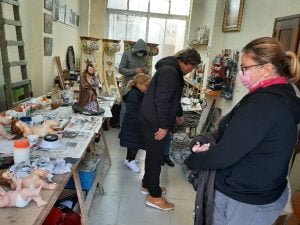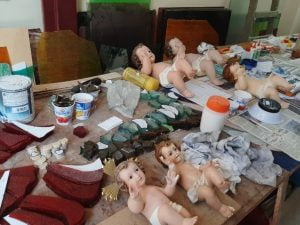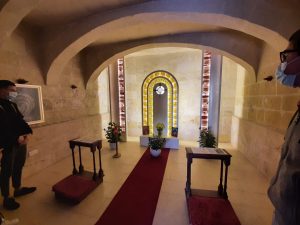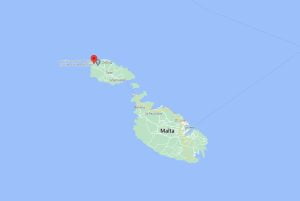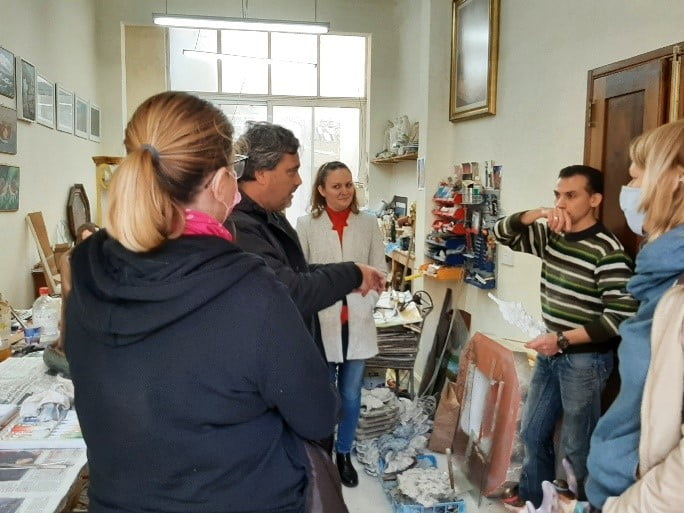A group of volunteers led by Alvin Pace keeps local traditions alive by handcrafting various stained glass items, religious statues and other traditional classical creations. Their aim is to prevent the loss of traditional crafts.
About Local Crafts Preservation
A group of volunteers led by Alvin Pace keeps local traditions alive by handcrafting various stained glass items, religious statues and other traditional classical creations. Their aim is to prevent the loss of traditional crafts. They joined forces with older artisans and started teaching the youths the skills of the traditional trade. Their efforts are recognized by the Local Council which is planning to initiate a training course so more volunteers and young could learn the skills of traditional crafts. The products crafted by the volunteers are used in the local traditional feast which takes place in June and is exhibited in the main square, church and public buildings. Their activities are funded through donations and by restoring privately owned traditional pieces.
The group understood that these traditional crafts were fast being lost so together with some elder craftsmen started teaching the youths to learn the trade and to keep the local traditions alive. The main stakeholders and beneficiaries are the public of Gharb who enjoy their work during the traditional local feast which covers a whole week.
Duration of the Good practice
2012 – ongoing
The main institution in charge of the Good practice
Ghaqda Vizitazzjoni Gharb
Alvin Pace
T: +356 792 326 35
The geographical scope of the Good practice
local
Location of the Good practice
Gharb, Gozo Island, Malta
Resources needed
The group raises its funds by doing restoration works for private houses that still have their crafts at home, through this they generate funds to be able to buy the materials. They also benefit from donations given during the feast where people donate some money as a thank you gesture when seeing the end results.
The group meets weekly in a small store which was provided by a private benefactor for the use of the youths who devote their free time to creating these crafts.
Evidence of success
Taking into account that the whole initiative was started by 1 youth and over the years the number of volunteers has increased is a positive factor.
The produced products are displayed to the general public during the traditional feast and each year they add to the various products produced over the years. An example of the appreciation of their products is through the number of requests from private people who ask them to do restoration of their statutes and buy some of the stained glass products.
Challenges encountered
The most challenging issue is to keep the young people active over the whole year, considering that some youths go to Malta to continue their studies so would not be available during the school months, however in June prior to the feast the activity and number of youths active increases drastically.
Potential for learning or transfer
This is a great example of how communities come together to preserve traditional crafts by traditional crafts by creating intergenerational cooperation and transfer of knowledge between elder craftsmen and the local youth.
How to start
Funding
Secure the funding for basic requirements:
- Rental of the training place
- Materials
- Flight and accommodation/meals
- Trainer
Partners
Potential partners will be mainly from Italy South especially Sicily, Spain south, Malta and possibly from rural villages where traditional crafts are still more common. It could also include artists who practice pottery and glass from other countries.
Volunteer training
Ghaqda Vizitazzjoni Gharb and Genista Research Foundation are in discussions with the local council to initiate a training course for more volunteers to learn the skills to further increase talent and to make sure that this tradition is kept alive for future generations. Traditional religious figurines are still common in some countries in the south of the Mediterranean (Malta, Sicily, and Spain), therefore a transnational training course between these countries and potentially others could lead to sharing of good practices and methodologies, understanding techniques and also encouraging others to start practising these traditions.
